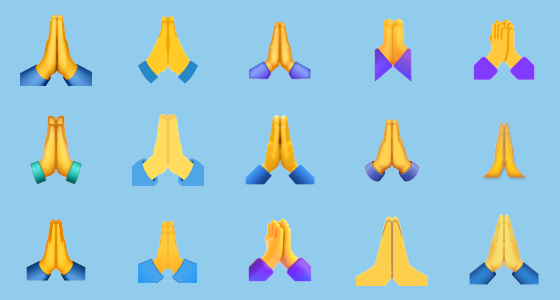-
Welcome to B4X forum!
B4X is a set of simple and powerful cross platform RAD tools:
- B4A (free) - Android development
- B4J (free) - Desktop and Server development
- B4i - iOS development
- B4R (free) - Arduino, ESP8266 and ESP32 development
You are using an out of date browser. It may not display this or other websites correctly.
You should upgrade or use an alternative browser.
You should upgrade or use an alternative browser.
New post reaction ?
- Thread starter Erel
- Start date
- Similar Threads Similar Threads
?
I think this reaction is more... hummm... "cultural"?
For me (and I'm not sure if everybody here in Spain would think the same) it seems more like: "please" or "I beg you"...
EDITED: for better understanding of what I mean... in our culture seems more like "praying" than "thanks"

🙏 Folded Hands Emoji
Two hands placed firmly together, meaning please or thank you in Japanese culture. A common alternative use for this emoji is for praye...
I thought the same for a long time, but then I understood that 2 people highfive each other.For me (and I'm not sure if everybody here in Spain would think the same) it seems more like: "please" or "I beg you"...
D
Deleted member 103
Guest
?
I pray for you that your tip is right. ?
I pray for you that your tip is right. ?
Rich young people! When I was young it meant: Hitchhiking (here we say: Autostop)Thumb up = I'm measuring something in the distance
When I was not yet born, it meant: "You can live"Rich young people! When I was young it meant: Hitchhiking (here we say: Autostop)
View attachment 114701
In India, "Namaste" is "greeting with respect", when we meet someone elder or respected person.
It is also "praying" before GOD.
It is also "praying" before GOD.
As José J. Aguilar says above there is a definite cultural element to the interpretation of this emoji. As a devout atheist I would never use this emoji to says thanks, its connotations to me are religious prayer.
It is also becoming fashionable in Italy; probably also due to Covid (avoid touching, shaking hands).In India, "Namaste" is "greeting with respect", when we meet someone elder or respected person.
? =God bless you
As a devout atheist I would never use this emoji to says thanks, its connotations to me are religious prayer.
It's a surprising emoji to add, considering it's so closely connected to religion for a lot of people. I've always thought this forum didn't approve of religious or political discussions. (A stance I strongly approve of.)
I don't see any harm with this reaction. Like any reaction in life, it is completely fine not to use it. Only if you want to.
I will use it, if I have to say "I pray to GOD for you" to a message.
This is more logical and normal for me.
This is more logical and normal for me.
As José J. Aguilar says above there is a definite cultural element to the interpretation of this emoji. As a devout atheist I would never use this emoji to says thanks, its connotations to me are religious prayer.
In many cultures like Thailand, Indonesia etc. this is a "wai" greeting to meet people with respect and not a religious greeting.
Of course I know that, but knowing it does not alter my own cultural interpretation of the symbol.In many cultures like Thailand, Indonesia etc. this is a "wai" greeting to meet people with respect and not a religious greeting.
Ok, this is really an universal understanding ?What is the difference between ? and ? ?
Thumb up = I'm measuring something in the distance
Two hands = I caught a mosquito!
